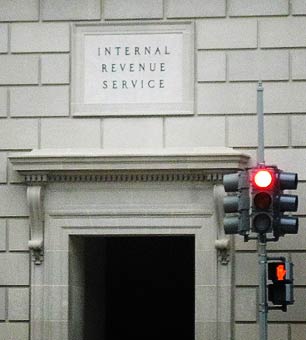Truthout is a vital news source and a living history of political struggle. If you think our work is valuable, support us with a donation of any size.
 Internal Revenue Service building in Washington, DC. (Photo: Shannon Smith / Flickr; Edited: JR/TO)After intense criticism from both ends of the political spectrum, the Internal Revenue Service has delayed indefinitely proposed rules that would have imposed new limits on social welfare nonprofits, which have pumped hundreds of millions of dollars from anonymous donors into recent elections.
Internal Revenue Service building in Washington, DC. (Photo: Shannon Smith / Flickr; Edited: JR/TO)After intense criticism from both ends of the political spectrum, the Internal Revenue Service has delayed indefinitely proposed rules that would have imposed new limits on social welfare nonprofits, which have pumped hundreds of millions of dollars from anonymous donors into recent elections.
The agency said it would postpone a hearing on the proposal it released in November defining more clearly what constitutes political activity for such groups, and would revise the plan to reflect some of the more than 150,000 comments it triggered.
Officials put no timeline on the process, disappointing those who had hoped the new regulations might kick in before this year’s mid-term elections.
“I think it’s unfortunate that new rules will be delayed even further and that we’re going through another election cycle” without them, said Paul S. Ryan, senior counsel with the Campaign Legal Center.
Others called the delay a prudent step that would give the IRS an opportunity to get a crucial change right.
“They’re not going to put out some slapdash rule just to check it off their list,” said John Pomeranz, a Washington lawyer who works with nonprofits that spend money on politics. He doesn’t expect the agency to finish the rules any time soon. “I think we’ll be lucky if they’re in place for the 2016 election.”
Social welfare nonprofits have poured money into politics since the Supreme Court’s Citizens United decision in 2010, which allowed corporations, unions and nonprofits to spend unlimited money on elections.
Social welfare nonprofits spent more than $256 million in the 2012 cycle alone, according to the Center for Responsive Politics. Campaign finance watchdogs have viewed their rise with concern, fearing the influence of so-called “dark” money from secret donors, and had called for more oversight from the IRS.
Under IRS regulations, the groups can spend some of their resources on politics, but must devote themselves mostly to social welfare to keep their nonprofit status. But the rules defining what is and isn’t politics are murky.
Late last year, the IRS moved to clarify the issue, but its proposal came under fire from both the left and the right.
Conservatives complained that the rules would stifle political speech. The American Civil Liberties Union chafed at a provision in the proposed rules that would prevent nonprofits from backing ads that even mentioned politicians in the two months before a general election.
“We have no doubt that the Service is acting with the best of intentions, but the proposed rule threatens to discourage or sterilize an enormous amount of political discourse in America,” the ACLU said in its written response to the proposal.
The plan was also criticized for impeding nonpartisan election work such as voter registration drives and get-out-the-vote efforts.
The IRS, still facing fallout from accusations that it singled out the applications of conservative nonprofits for special scrutiny in the run-up to the 2012 election, decided it would make revisions.
“Given the diversity of views expressed and the volume of substantive input, we have concluded that it would be more efficient and useful to hold a public hearing after we publish the revised proposed regulation,” the agency said in statement.
A terrifying moment. We appeal for your support.
In the last weeks, we have witnessed an authoritarian assault on communities in Minnesota and across the nation.
The need for truthful, grassroots reporting is urgent at this cataclysmic historical moment. Yet, Trump-aligned billionaires and other allies have taken over many legacy media outlets — the culmination of a decades-long campaign to place control of the narrative into the hands of the political right.
We refuse to let Trump’s blatant propaganda machine go unchecked. Untethered to corporate ownership or advertisers, Truthout remains fearless in our reporting and our determination to use journalism as a tool for justice.
But we need your help just to fund our basic expenses. Over 80 percent of Truthout’s funding comes from small individual donations from our community of readers, and over a third of our total budget is supported by recurring monthly donors.
Truthout has launched a fundraiser, and we have a goal to add 182 new monthly donors in the next 24 hours. Whether you can make a small monthly donation or a larger one-time gift, Truthout only works with your support.
